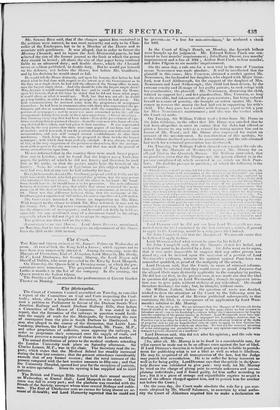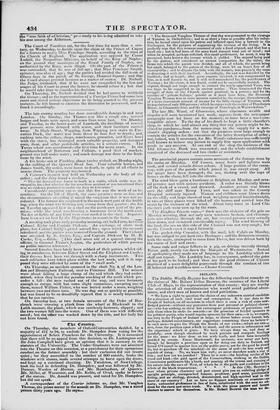In the Court of King's Bench, on Monday, the Ipswich
bribers were brought up for judgment. Mr. Edward Bolton Finch was sen- tenced to four months' imprisonment ; Julitillurry Dasent, two months' impribonment and a fine of IOU ; Arthur Bott Cook, to four months', and Jail l'ilgrim to six months' imprisontnetit. On the same day, a rule nisi for a new trial in the case of Urmston versus Newcomett was made absolute. It will be recollected that the plaintiff in this cause, Mrs. Urnistlai, obtained a verdict against Mr. Neweumen, the husband of her daughter, who eloped with Major Strat- ford, new Lord Altiborough, for the support of the daughter of Mrs. Newcomen and Lord Aldborough ; this child had been driven, by the extreme cruelty and ill-usage of her guilty parents, to seek refuge with her grandmother, the plaintiff. Al r. NelVCoillem disowning the child, refused to support her ; mid her grandmother, Mrs, Urinston, as long as she was able, had taken care of the pour creature; but being reduced
herself to us state of poverty, she brought an action against Mr. New- council to recover the money she hail laid out in supporting his wile's ehild. Jury gave her a verdict with damages equal to tat is year for Miss Newcomen's maintenance ; and this was the verdict which the Court set aside.
On Tuesday, Sir IVilliam Follett read 11 letter from Air. Hume to Sir John Gibbons, to the effect that Alt. Hume was satisfied that he had been altogether in error in stating that Sir John had offered or given a licence to any voter as a reward for voting siguiest him and in Into ur of' AI r. 1iftiod ; and '1, r. Ilinne also expressed his regret on account of the misstatement. 111 consideration of this apology, Sir John Gibbons declined pressing the prosecution ; alai the rule obtained last week for a criminal prosecution WSO, d i chit On Thursday, S.ir William Follett showed eatt-e against the rule ob- tained by the Marquis of 1‘'estineath again, t Alr. Alurray for all ;tilt lihel ill the Q/tatteilr/ Review. Sir %Vilna!!! Contended, that III) proof was given that the Alarquis was the person :Alluded to in the passage complained of, which oecui red in no article on Irish Poor- laws. Ile read the passage in question ; of which the following is the
material part-
'. tvhiterontism. ! ye mill), full fed o :th every luxury, ii I'1l illing on silk, lift our ,A es awl hater, w ill italOuttion at the atrocity lt: the 54 1,tefeet ! Huy what \tell I■1 11.` \ 11111 11.1.1111'4, e \ tea 4,1111111A, if ylilir share or the ',lessons. .v11411.1.11 by ce.,11tal :ma a pit cl Lzo,erliluent, amounted to 1:o ila.le III I. 1 leaky clued for shelter. tott,ti ,tiats Ion. a tali:aiding 14 s1 eo4raing for I ..101 fifteen others, nod it hat dry ledatoei 3011 1.01114 beg or steal to 14 tile eti•lei,,, a famine? The %total,. suiely, 11.i that nivn beronte mousters utoter such 61.'11ot:owes -that
the) make war upon the world awl the %toad's law. ‘‘Itiell neglects and oppresses
them Ilmt 'Aim; 1.41 lo the destitutioll th.• •fal Il eXhillit Ill. a1llo11,16011, felelft lii. s stele •Iiet Ith.s•s-o a II,. Iili o ae-ijas. ol ■•■•;,.ty. No, the %%owlet 1,, that philosoplous tiottal it i tem, It I .it itutilul t11.1 feltrettlIge Meek ;IS 1105e We let \ e fettled remaitt tottellel...1. II ill:'r It h IlhiIII the chari- table sympathies of the poor tor each 0;1111% and 10 ple,eix■• a e.le,:e511:111. vion.1 li•enng au11:11g 1111111, III Ill by It I 4tl pr.o, i 11101 Pe' the flehlilete ; or hiItIsltsiIl1tt,l, 4Sill, lihe 1,,t11 11,11 Ilf•f+1: 11 fl a Pe, a 1.1W I':lit Illn■Isl.,,i.”1■■• le% i,•■1 •1 th, ,A• What felf • et t!s iili, .4 II ? Ali. the \ .It't II I. the IIEW or I !dale! ”u. firff thee s■ • I ilielftillate If' floe I f4.1? Ifr lad se,,t ha. if 11.1 let 11 ow esi.toese to enahie II ,:mgle peer :I.■ toe la.t IllIlhilIli of his ex- naltai?"
Lord Diaiman said he dhl not 5..ve how Lord lVv-,thic:itii wa.s
Coil-
1I('(tCIl with the vont:tilled in the last sentence ; which, if proved to apply to his Lordship, would be a very gross lib..1 indeed.
Sir John C 'ampbell said that the Alai (lois cif 'Westmeath swore that he believed it apply to him. Lord Denman asked what reason lie gave for his belief?
Sir John Campbell said, that the Alariiiiis seat(' his belief, and wished the point to be decided by a Jury. Sir John went on to argue, that it svas quite impossible to suppose that any other person was Mined at ; and he insisted upon the omission of a portion of Lord AVestmeatles evidence, wherein his opinion against Poor.laws was somewhat qualified, as proof of the malignity of the attaek.
Lord Denman said, that the Court, in eases of criminal informa- tion, should be satisfied that they could swear as grand Jurymen that the alleged libels ware distinctly applicable to the complain:lig parties. Ile did not see that, in the present ease, it was made out that the libel in question did apply to Lord Westmeath ; though its apparent inten- tion was to give pain, without striking at any individual. Ile should therefore discharge the rule ; but, he thought, without costs. Sir William Follett, before the question of costs was decided, wished to draw the attention of the Court to the following note in- serted in the number of the Review published subsequently to that containing the libel, in consequence of an application by Lord West- meath's solicitor to Mr. Murray.
" Note, on No. 109. p. O. We are informed that the Marquis of \Westmeath thinks himself entitled to complain of the passage in this page, s here we had occasion to introduce an all ;ion to his Lordship's befell, the lllll titissioners fur Inquiry into the condition of the poorer classes in Ireland. Lord Westmeath must have mis- understood the passage in question. We impugned his Lordship's tloctritte, that 'a Poor-law can in nu shape be ltwied in Ireland without UM alVICIMIS violation of Me rights of property,' and we put an hypothetical case, in order to apply to tit:At doctrine the logical argillnent called the rectuctio ad akut haa. haol nut the remotest intention of so far outstepping our jurisdiction as to esptesAA any opinion concerning the noble 'marquis's ptivate character as a landlord."
Lord Denman said, this did not alter his opinion; and the rule was discharged, without costs. [So, after all, Mr. Murray is to be fined in a considerable sum, for what cannot be made out to be an offence even against the law of libel.
If Lord Denman's doctrine is to hold good, any man is liable to punish- ment for publishing what is not a libel as well as what is libellous. He may be acquitted of all transgression of the law, but the Judge
may punish him nevertheless. He is to suffer for being innocent as well as for being guilty. LordDenman says that the article in the Qum-- ter& Review was calculated to give pain; very well, let Mr. Murray be tried on the charge of giving pain to certain unknown and uncom- plaining individuals ; and if found guilty, let him suffer according to Jaw; but it is a piece of strange amid unjustifiable caprice to acquits man of the offence charged against him, and to punish him for another not before the Court.] the "true faith of aChristian," pis:viously to his being admitted to take his *eat among the Aldermen.



























 Previous page
Previous page